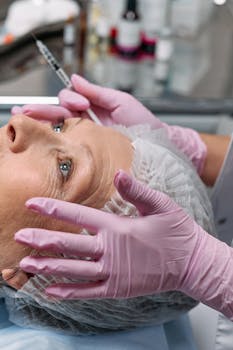Experiencing swelling 4 weeks after a facelift can be concerning for many individuals. It’s important to understand that each person’s recovery timeline varies. While some may notice a significant reduction in swelling at this point, others may still experience puffiness or tightness in the affected areas.
Why Am I Still Swollen 4 Weeks After a Facelift?
Swelling is a natural part of the healing process following surgery. At 4 weeks after a facelift, still experiencing some swelling is not uncommon. This can be due to a variety of factors including individual healing rates, the extent of the surgery, and post-operative care practices. Typically, the majority of swelling subsides within the first few weeks; however, it may take longer for some individuals to see complete results.
Understanding Hard Swelling After a Facelift
Hard swelling after a facelift can occur as the tissues heal and the initial inflammation subsides. This type of swelling, sometimes described as firmness or tightness, can be attributed to internal scar tissue formation. As time progresses, the tissue generally softens and the skin adapts to its new contour. Staying in touch with your healthcare provider can ensure any uncommon symptoms are promptly addressed.
Factors Influencing Swelling Post-Facelift
Several factors can contribute to the persistence of swelling 4 weeks after facelift surgery. These include:
- The extent of the facelift procedure.
- Individual differences in healing and inflammation response.
- Post-operative care such as elevation and cold compress application.
- Lifestyle factors including diet, hydration, and smoking.
Effective Tips for Managing Swelling
While some level of swelling is unavoidable, certain practices may help in promoting healing:
- Maintain an elevated head position, even when sleeping, to reduce fluid accumulation.
- Apply cold compresses as advised by your healthcare provider.
- Stay hydrated to help flush out toxins and support the lymphatic system.
- Avoid activities that increase blood pressure to minimize additional swelling.
Consultation with Your Surgeon
If you are concerned about persistent swelling or hard swelling after a facelift, a consultation with your surgeon can be beneficial. They can evaluate whether the swelling is within the expected range and offer targeted advice or interventions if needed. Additionally, learning more about what to expect from related cosmetic procedures such as fat transfer and breast augmentation may provide context for understanding recovery experiences.
What to Expect 4 Weeks After Facelift Still Swollen
It’s natural to feel wary when, 4 weeks after a facelift, still experiencing swelling. Patience is a key aspect of recovery, as visible improvements can be gradual. Following your surgeon’s post-operative instructions and attending all follow-up appointments helps ensure the best results. For comprehensive information on health and recovery after surgery, you may refer to this health resource.
- Swelling is common 4 weeks after a facelift.
- Hard swelling may occur due to tissue healing.
- Follow care instructions to manage swelling effectively.
- Consult your surgeon for personalized advice.
- Expect gradual improvements and final results over time.
FAQ
Is swelling normal 4 weeks after a facelift?
Yes, some swelling is normal even at 4 weeks post-facelift. Each individual’s healing process varies, and factors like procedure extent and personal health can influence swelling.
What causes hard swelling after a facelift?
Hard swelling may result from the formation of internal scar tissue and the natural healing process. This firmness should soften over time as the tissues adapt.
How can I reduce swelling after a facelift?
To reduce swelling, keep your head elevated, use cold compresses, stay hydrated, and follow your surgeon’s post-operative care instructions carefully.
When should I be concerned about swelling?
If swelling is accompanied by severe pain, redness, or signs of infection, contact your healthcare provider immediately. These could indicate complications that require prompt attention.
How long does it take to fully heal from a facelift?
While initial recovery takes a few weeks, complete healing and full results may take several months. Patience and adherence to recovery protocols are essential for optimal outcomes.






